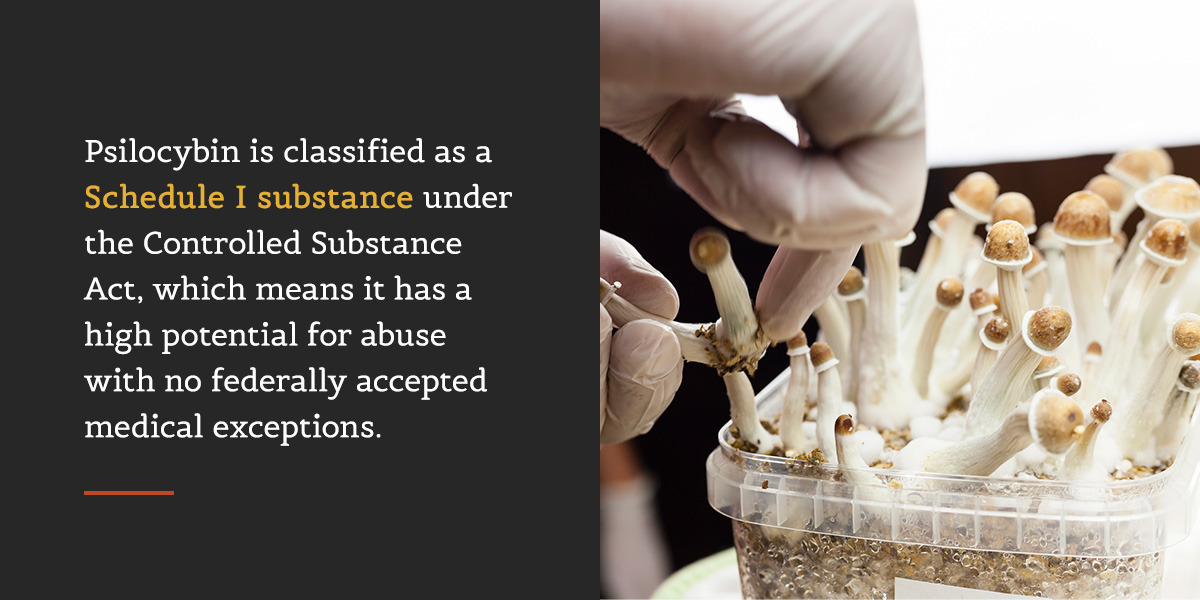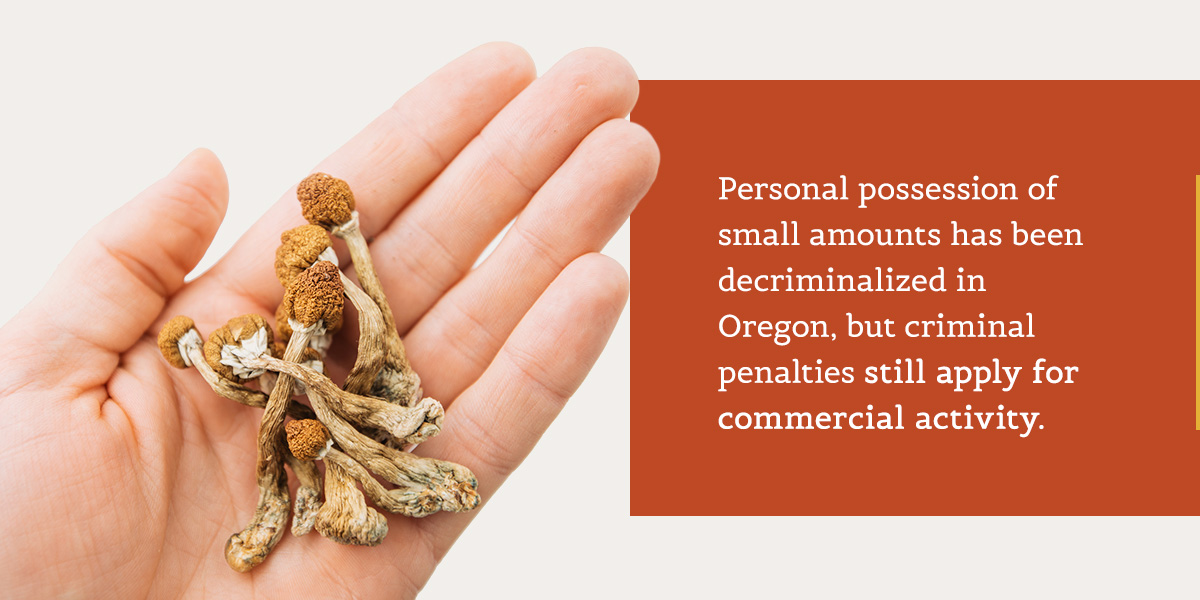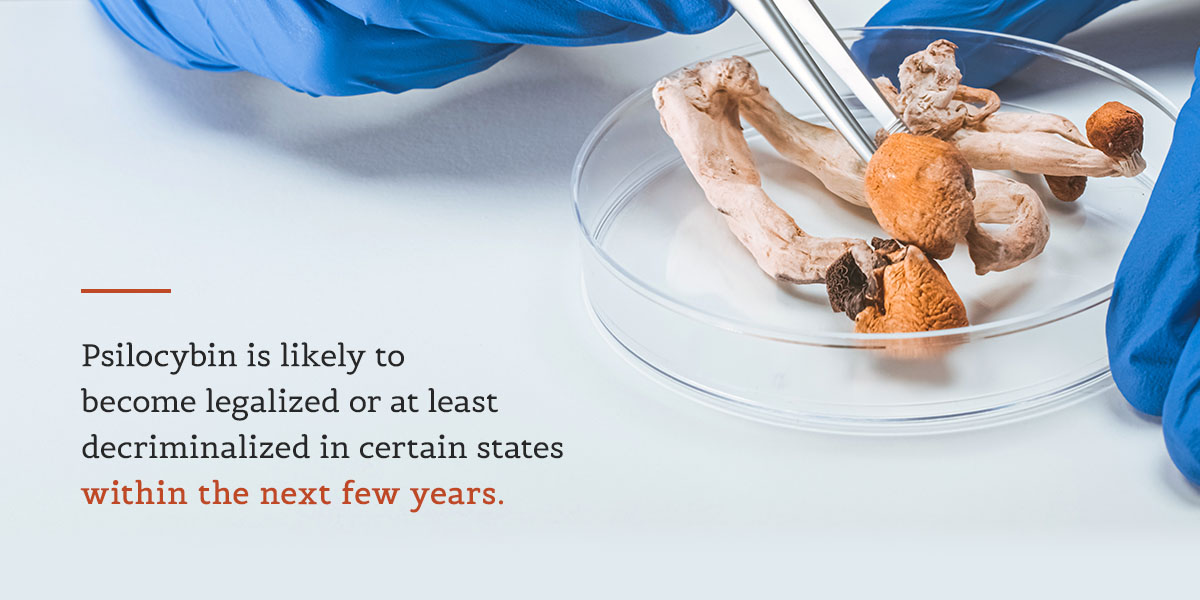
Psilocybin Laws in the United States
Researchers are becoming increasingly interested in the therapeutic benefits of psilocybin, a powerful hallucinogenic substance commonly taken at raves and nightclubs. If they can prove positive results, we could be looking at widespread decriminalization and legalization in the coming years.
- Legalized
- Lowest law enforcement priority
- No CPOM
- CPOM
Our clients come first.
LEARN MORE ABOUT HARRIS SLIWOSKIWhat Is Psilocybin?
Psilocybin is a naturally occurring hallucinogenic drug found in certain species of mushrooms. It’s classified as a Schedule I substance under the Controlled Substance Act, which means it has a high potential for abuse with no federally accepted medical exceptions. That said, some states are conducting research into the drug’s usefulness for mental health treatment.
Common street names include:
- Mushrooms
- Shrooms
- Magic mushrooms
When taking them, people often eat the mushrooms or add them to other foods to mask the bitter flavor. Alternatively, they can be ground and brewed into a hallucinogenic tea.
The Effects of Psilocybin
Psilocybin primarily causes auditory and visual hallucinations that begin roughly 20 minutes after ingestion. A trip can last about six hours, during which the user can experience:
- Intensified or overwhelming sensory experiences
- Amplified emotional awareness
- Time distortions
- Ego death, or the loss of the sense of self
- Inability to distinguish fantasy from reality
An overdose can cause serious physical consequences, such as panic attacks, nausea, lightheadedness, paranoia and lack of coordination. Though a psilocybin overdose can be fatal, this is rare due to the mushrooms’ low toxicity rating.
In general, the drug has a low risk of physical harm. The greatest risk when using psilocybin is the potential to experience a “bad trip,” which can lead to psychosis. There’s no evidence of it causing dependence, but it’s possible to develop a tolerance by repeat use.
How Does Psilocybin Affect the Body?
When ingested, your body breaks down psilocybin to produce psilocin, which is the chemical compound that produces psychoactive effects.
Here’s the scientific breakdown. Psilocybin and psilocin are psychedelic tryptamines, which resemble serotonin in their molecular structures. For context, serotonin is a neurotransmitter that plays a significant role in regulating body functions such as mood, sleep, nausea and digestion.
Because psilocin resembles serotonin, it can activate the same receptors in the brain. Receptors located at site 5HT2A are especially of interest, as these receptors regulate various physical and mental functions including imagination, mood, perception and learning. That’s been a key discovery in psilocybin research — experts believe the drug’s ability to connect with 5HT2A receptors is why it shows so much promise in treating patients with treatment-resistant depression (TRD).
Research has also found that psilocin affects the Default Mode Network (DMN), which serves to connect different areas of the brain to store and recall specific information. Psilocin temporarily shuts down some of the key connections in the DMN, which prevents normal connections in the brain from functioning while under the influence. As a result, the brain must create new internal connections, which can open the user up to unusual and sometimes terrifying ways of thinking.
What Is Psilocybin Used for Medically?
Although the drug has potential for misuse, psilocybin shows great potential in treating various mental health disorders, including but not limited to:
- Anxiety
- Depression
- TRD
- Obsessive-compulsive disorder
- Anorexia nervosa
- Addiction
- Post-traumatic stress disorder (PTSD)
Microdosing may unlock some of the other benefits of psilocybin, such as improving psychomotor symptoms of conditions such as multiple sclerosis and Parkinson’s disease. However, the research is based primarily on observations rather than empirical evidence, so it’s still too early to say for sure whether it’s a good treatment.
Will Psilocybin Be Legal?
The legal status of psilocybin mushrooms may change soon in many parts of the country, as various states have already introduced bills to legalize medical and therapeutic psilocybin use.
Where Is Psilocybin Already Legal?
Oregon was the first state to legalize medical psilocybin treatment. Beginning in 2023, residents over the age of 21 were able to access supervised psilocybin treatments at government-approved facilities.
In November 2022, Colorado became the second state to vote to legalize medical psilocybin treatments. Clinics are expected to start offering psilocybin treatments by the end of 2024.
That said, there are some important rules to understand with this regulation. Unlike medical marijuana, psilocybin patients are unable to purchase the drugs for at-home use. Personal possession of small amounts has been decriminalized, but criminal penalties still apply for commercial activity.
Are Psilocin Pills Legal?
Not yet. While we may one day find over-the-counter mushroom pills for anxiety, that’s likely to take some time.
For example, a study by Compass Pathways found that even a single dose taken in combination with psychological therapy could significantly reduce depressive symptoms. However, researchers observed that some participants experienced suicidal ideation more than three weeks after treatment — more research is necessary to identify the cause of such risks.
Where Is Psilocybin Decriminalized?
Although the consequences of personal psilocybin use have been reduced in many areas around the country, it’s important to understand the drug is still technically illegal in all of these areas.
As of November 2022, the following states and cities have loosened regulations on psilocybin use or are actively moving toward decriminalization:
- Washington: State penalties for personal use and possession of Schedule I substances were reduced in 2021. Additionally, the state established a psilocybin work group to study the drug. The cities of Port Townsend and Seattle have both placed psilocybin use as the lowest priority for law enforcement.
- California: Although past statewide legalization failed due to lack of support, Oakland, Arcata and Santa Cruz have all deprioritized the personal use and possession of psilocybin.
- Michigan: Statewide decriminalization efforts are currently underway for Schedule I and II drugs, including Senate Bill 0631. The cities of Detroit, Ann Arbor and Hazel Park have deprioritized possession and personal use.
- Pennsylvania: If House Bill 1959 passes, research and clinical studies would become legal in the state.
- New York: Senate Bill A8569A, introduced in December 2021, proposes creating a state-funded medical psilocybin treatment program for veterans and first responders with PTSD and other mental health conditions. The bill also promotes establishing a public research program for psychedelic substances. Other decriminalization bills have also been introduced.
- Massachusetts: House Bill 1494 would legalize the study of entheogenic plants and decriminalize personal psilocybin possession statewide. Personal use and possession have been deprioritized in Somerville, Cambridge, Easthampton and Northampton.
- Rhode Island: House Bill 7715 would decriminalize possession of buprenorphine and psilocybin and allow medical practitioners to prescribe psilocybin for therapeutic purposes. Additionally, House Bill 7896 goes even further to decriminalize possession of any controlled substance except fentanyl.Two states provide limited exceptions for psilocybin:
- New Mexico: The act of growing fresh psilocybin mushrooms doesn’t qualify as illegal drug manufacturing. However, intent to manufacture and distribute these substances — including packaging and selling — is considered a felony.
- New Hampshire: Qualified religious use of certain psychedelics, including psilocybin, is protected under the state constitution.
The following states have passed legislation to establish a working group to study therapeutic treatments involving psilocybin and other controlled psychedelic substances:
- Texas
- Utah
- Hawaii
- Maryland
- Connecticut
- Washington
Stay up to date on changing psychedelic legislation by following our Psychedelics Law Blog.
Outlook: Psilocybin in the U.S.
Psilocybin is likely to become legalized or at least decriminalized in certain states within the next few years. This could be beneficial for the psychological and psychiatric field, but more research is necessary to prove the substance’s effectiveness in the long term.
We’d like to hear from you. What are your thoughts on legalizing psilocybin?












